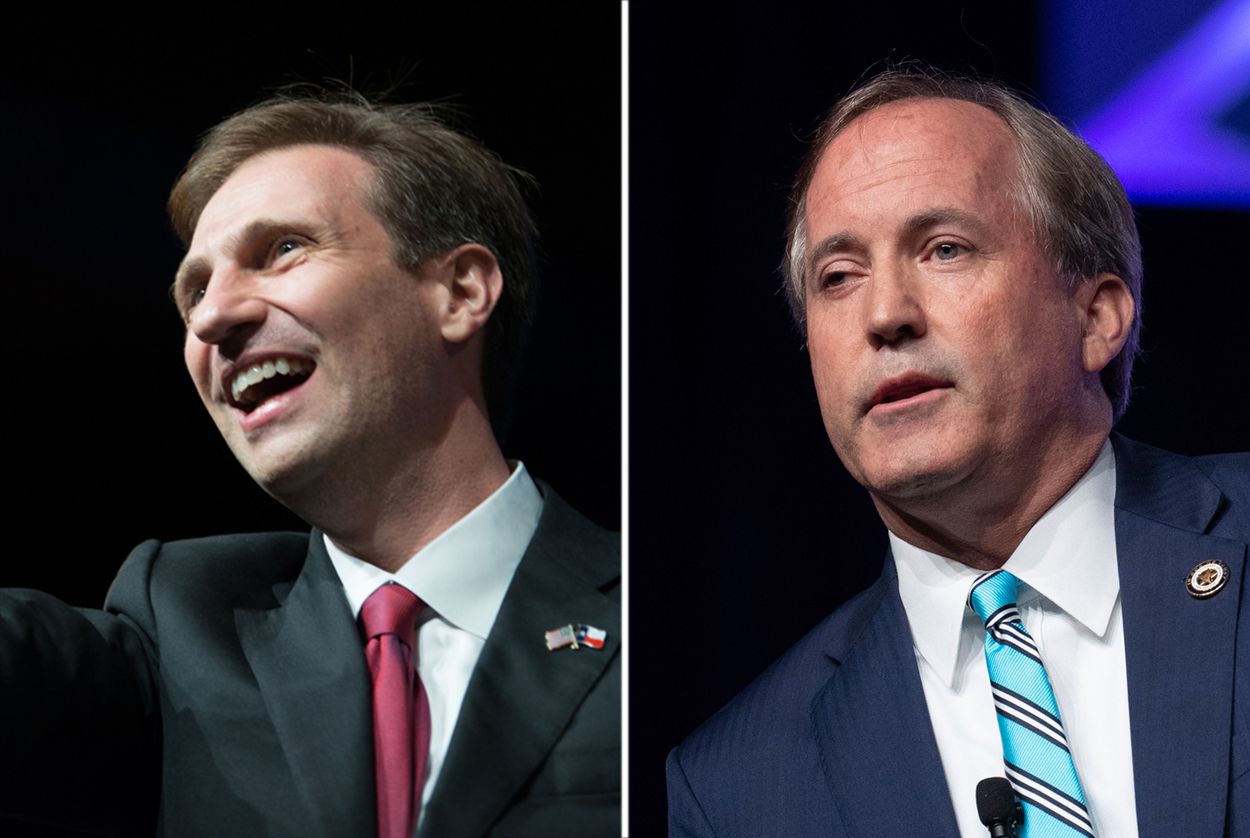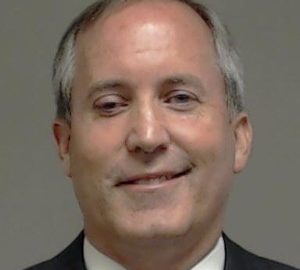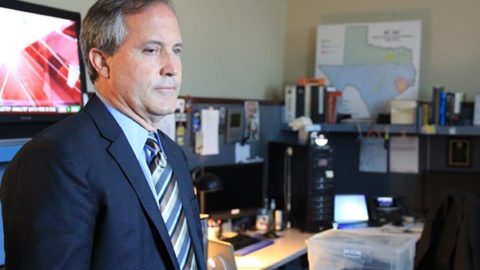Three years ago almost to the day, a Collin County grand jury indicted Texas Attorney General Ken Paxton for securities fraud. As the state’s top lawyer turned himself into a jail in his hometown of McKinney and smiled for his mug shot, Democrats couldn’t help but feel optimistic. The last time Texas elected a Democrat for attorney general was over two decades ago. Paxton’s legal troubles could potentially serve, they hoped, as the springboard to breaking that streak.
What perhaps no one could have foreseen back in 2015 was the dizzying array of twists and turns the legal case against Paxton would undergo. Three summers later, there is still no trial date in sight, and one is unlikely to emerge before Election Day.
Yet despite avoiding a challenge from within his own party this year – arguably the biggest political threat for a statewide official in deep-red Texas – the political fallout from Paxton’s indictment remains to be seen. In November, he’ll face his first actual test of it at the ballot box: a challenge from Democrat Justin Nelson. The well-credentialed Austin lawyer is framing the race as a crystal-clear referendum on the charges that have dogged Paxton for the vast majority of his first term.
“The question that voters will have is who voters want to hire as a lawyer for Texas, for all Texans,” Nelson said in a recent interview. “Voters will be able to choose me, someone who has clerked for Justice Sandra Day O’Connor on the Supreme Court, who has taught at the University of Texas law school, Texas Super Lawyer, a partner at a successful law firm, versus my opponent, who it’s embarrassing that he’s indicted for fraud in one of the most heavily Republican counties in Texas.
“And I think that when voters see that contrast, it will be integrity versus indictment.”
There has been a long-running gag order on all sides in the securities fraud case, leaving Paxton running for re-election without the ability to address his biggest political vulnerability. He held firm on the gag order when asked about the indictment in a recent interview, saying he looks forward to discussing the case “as soon as the courts allow me to speak.”
“I’ve done my job,” he then said. “I’ve worked extremely hard to represent the people of Texas. It’s been an honor and really the greatest opportunity of my life.”
Stretching back before he was elected attorney general in 2014, Paxton has faced scrutiny related to his soliciting of investment clients. In late July 2015, a Collin County grand jury indicted him on two first-degree felony charges of securities fraud and a third-degree felony charge of failure to register. The charges, to which Paxton pleaded not guilty, allege that when he was a state representative, he mislead investors in a North Texas technology company called Servergy, recruiting them without disclosing he was making a commission.
In the time since then, Paxton drew similar, civil charges from the U.S. Securities and Exchange Commission — and beat them. But the original, criminal case at the state level has persisted, surviving multiple attempts by Paxton’s lawyers to defeat it before trial. The case has also gone through a change in venue — prosecutors successfully pushed to have it moved from Paxton’s home county, Collin County, to Harris County — a change in judge and three delays in the trial date, with the most recent one proving indefinite.
That is because all sides are currently waiting for a decision from the state’s highest criminal court, the Court of Criminal Appeals, on whether the prosecutors can be paid, an issue that has effectively frozen the securities fraud case. That side legal battle stems from a series of lawsuits filed by Jeff Blackard, a Paxton supporter and Collin County resident, who has sought to limit payments to the prosecutors, arguing excessive taxpayer money is going toward the case.
In December, the Court of Criminal Appeals agreed to hear prosecutors’ challenge to a lower-court ruling that voided a six-figure invoice for work dating back to January 2016. But since then, the Court of Criminal Appeals has not taken any additional action on the case, and it went on summer recess last month, ensuring any further developments will not come until the fall at the earliest.
Nelson has said Texans deserve a trial before Election Day to know whether their attorney general will wind up in prison. But all sides are at the mercy of the Court of Criminal Appeals, which can take however long it wishes to first sort out the prosecutor pay case.
“It is not unusual for the Court of Criminal Appeals to wait with a case, and you know there is no time limit for them,” said David Crump, a professor at the University of Houston Law Center. “The only real … factor that creates any kind of time issue is their own sense of duty. Over and over again, I’ve seen courts want to take their time in spite of external events.”
Paxton’s team has maintained it has long been ready for trial.
“No one is above the law, but no one should be below it either,” Paxton spokesman Matt Welch said in a statement. “When a case has gone on for over three years with no end in sight, it conflicts with a citizen’s right to a speedy trial guaranteed under the U.S. and Texas Constitution. Attorney General Paxton looks forward to his day in court when he can finally put this politically motivated prosecution behind him.”
Brian Wice, the special prosecutor who has taken the lead on the payment case, declined to comment on its status on behalf of himself and the two other prosecutors.
Paxton’s allies and supporters argue he has been anything but distracted as attorney general, building up an impressive record and using his platform to take a national lead on some of the most prominent legal issues of the past three years – including multi-state efforts to repeal signature Obama-era initiatives related to health care and immigration.
“I think if you look at, just to take one example, the attorney’s record before the United States Supreme Court, litigating some of the most high-profile cases, cases that are difficult cases, several of them decided 5-4 — I think the fact that the state of Texas under the AG’s leadership prevailed virtually across the board speaks to that,” said Allyson Ho, a veteran appellate litigator in Dallas. “I think the results of that speak to the caliber of his team and his leadership and to the conservative causes that the voters of Texas care deeply about.”
In the process, Paxton has emerged as one of President Donald Trump’s closest allies among GOP attorneys general. Last year, Paxton was the first state attorney general to come to the defense of the president’s controversial ban on travel from seven predominantly Muslim countries, filing an amicus brief backing it in the U.S. Court of Appeals for the 9th Circuit. Paxton was later joined by over a dozen states in support of the travel ban, which was upheld last month by the U.S. Supreme Court.
Trump has announced his support for Paxton’s re-election campaign twice — first in a tweet days before the March primary and then in May while speaking at the National Rifle Association meeting in Dallas. Paxton believes it is a relationship that benefits Texas, providing a “night-and-day difference” with the state’s hostile stance toward Trump’s Democratic predecessor.
“A great thing is dialogue,” Paxton said in the interview. “Before with the Obama administration, the only thing we can do is sue them. With this administration, we can meet with almost anyone we want to meet with [and] discuss issues before we have to pursue any kind of confrontational litigation.”
Texas Republicans haven’t appeared particularly fazed by Paxton’s lingering legal problems as he runs for re-election. Among his closer supporters, it continues to be viewed as a political witch hunt that stretches back to 2014. That’s when one of the three allegations that comprise the securities fraud case — that Paxton failed to register with the state securities board — came up in Paxton’s GOP primary against then-state Rep. Dan Branch of Dallas.
“We first heard these accusations in the 2014 primary and they were thoroughly vetted and the voters made their voices heard in the primary and the general election,” said state Sen. Bryan Hughes, a Mineola Republican and longtime Paxton ally. “Since that time, there’s been an attempt to gin up other charges, but I think it all goes back to the same facts, and the voters have heard this. It has been thoroughly vetted and litigated and I believe the voters will reject these charges again.”
It also does not go unobserved among some Paxton supporters that he is fighting the securities fraud case against the backdrop of Trump’s battle against his own alleged “witch hunt”: special counsel Robert Mueller’s investigation into Russian interference in the 2016 election. Hughes said it was fair to compare the two, adding that he believes “more and more people are concerned about the criminal justice system being used as a political weapon.”
The dearth of intra-party resistance to Paxton’s re-election bid became even clearer late last year, when the filing deadline for March primary came and went without anyone signing up to challenge him — the only other major statewide official who did not draw a primary opponent then was Comptroller Glenn Hegar. And while Gov. Greg Abbott conspicuously declined to say whether he voted for Paxton and two other fellow statewide officials in the nominating contest, the top of the ticket is clearly behind Paxton for November.
“Ken Paxton has been a fearless defender of the Texas and United States Constitutions and Governor Abbott is proud to support his re-election,” Abbott spokesman John Wittman said in a statement.
In Nelson, Democrats have ample reason to be optimistic. He brings an impressive resume to the race as a clerk for former U.S. Supreme Court Justice Sandra Day O’Connor and current partner at Houston-based litigation powerhouse Susman Godfrey. That network that comes with that — as well as Nelson’s own wealth — has allowed him to build a bigger war chest than any other Democratic statewide candidate beside U.S. Rep. Beto O’Rourke, who is running a far more high-profile race to unseat U.S. Sen. Ted Cruz. Still, Paxton maintains a wide cash-on-hand advantage.
In addition to Nelson’s fundraising, Democrats have been buoyed by a pair of public polls that suggested the race may be close. A recent University of Texas/Texas Tribune poll found Paxton leading Nelson among registered voters by just 1 percentage point, but 26 percent of voters had yet to pick a candidate.
“I feel really good about his race,” said state Sen. Sylvia Garcia, D-Houston, ranking Paxton and Agriculture Commissioner Sid Miller as ripe targets for Democratic upsets in November. “[Nelson’s race] is particularly compelling because … I’ve seen people react when you talk about an indictment and an attorney general — I mean, this is our lawyer, and they can’t get their head around the idea that our own lawyer is under indictment. They’ll easily concede, ‘Yeah, he’s innocent until proven guilty’, but it’s the whole image — it’s the whole cloud over the work — it just doesn’t sit easy when you hear about that.”
To be sure, Nelson is not building his challenge entirely around the incumbent’s legal troubles. Nelson also is campaigning on issues like ending gerrymandering, which was the topic of a pub crawl he led last month in Austin that touched three congressional districts in a five-block radius. During an interview at the last stop — at Easy Tiger in downtown Austin — Nelson said he would use his platform as attorney general to fight partisan gerrymandering in particular through written opinions, through the litigation process and at the Legislative Redistricting Board, where the attorney general has a seat. Nelson and Paxton were already on opposite sides of the issue before their race began, having signed on to dueling amicus briefs in the Wisconsin gerrymandering case that the U.S. Supreme Court declined to decide on last month.
The anti-gerrymandering pub crawl turned out Nelson supporters like Sarah Sharp, an Austin musician who has known him since high school.
“I love that he’s never run for office before and that I also happen to personally know that he’s a brilliant man and a thoroughly decent man,” Sharp said as Nelson mingled with the boisterous happy-hour crowd at Easy Tiger. “It would be nice to have less corruption. I believe Justin when he talks about actually following the rule of law.”
The contest for attorney general is playing out in the shadow of higher-ballot races for U.S. Senate and governor, and accordingly, there has been little to no sparring between Paxton and Nelson.
Paxton, asked in a November C-SPAN interview about his re-election campaign, welcomed all challengers and said he was “happy to debate anybody on the issues and look forward to it.” However, he was noncommittal in the recent Tribune interview when asked whether he would debate Nelson, calling it “an issue that we’ll address down the road.”
The race is on the radar of the Democratic Attorneys General Association and its Republican counterpart, of which Paxton is vice-chairman. The Republican Attorneys General Association has already contributed $150,000 to Paxton’s campaign, and RAGA Executive Director Scott Will, in a statement, said Paxton is “one of our leading rule of law champions, and for good reason, he has an envious record of accomplishments.”
DAGA, meanwhile, formally endorsed Nelson the day after he secured his party’s nomination and quickly launched a mini-website attacking the incumbent as “Corrupt Ken Paxton.” Since then, DAGA says it has texted more than 100,000 voters in Texas as part of a multi-state program to educate electorates about the office of attorney general and the importance of elections for it.
In an interview, DAGA Executive Director Sean Rankin said the association was taking Texas “very seriously,” encouraged by the demographic changes in the state, a national landscape poised to favor Democrats, the potential for crossover voters and, of course, the securities fraud case.
“He has not gone through an election cycle while under indictment,” Rankin said, dismissing GOP claims that Paxton’s legal troubles are old news to voters. “The average Texan does not want someone who’s under indictment in this office.”
Article by Patrick Svitek • View on Houston Chronicle



